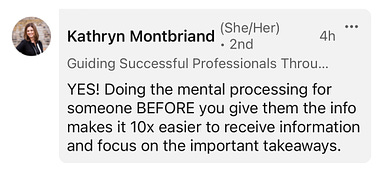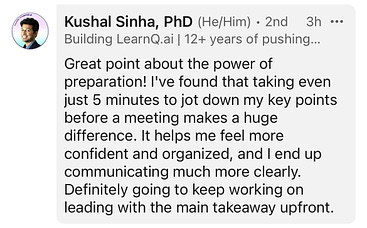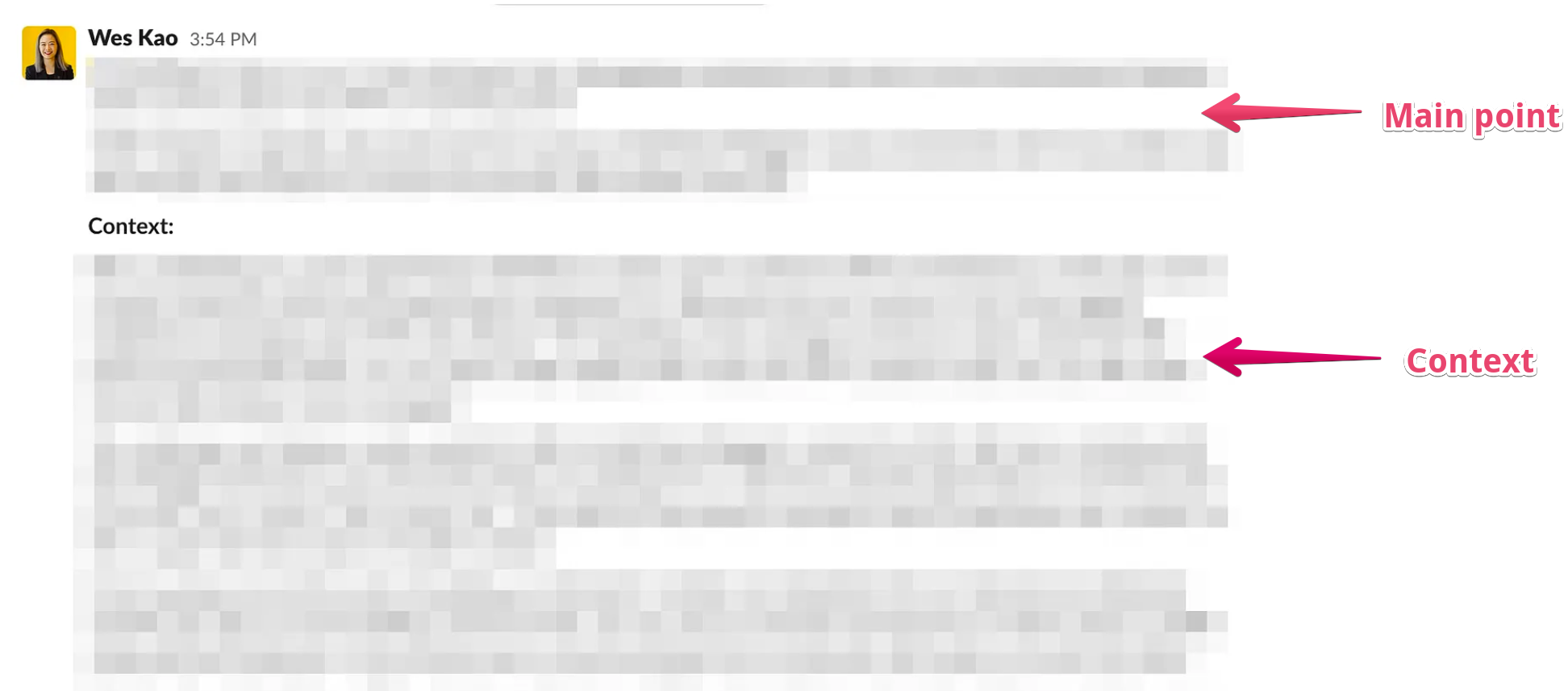Wes Kao - How to be more concise
How to be more conciseThe truth about why it’s so hard to be concise, and 9 tactics I use to tighten my communication👋 Hey, it’s Wes. Welcome to my weekly newsletter on managing up, career growth, and standing out as a high-performer. ⛑️ If you’re looking for a sparring partner and external perspective, I typically work with tech leaders on: Managing up to a CEO/SVP, strengthening your executive communication, increasing your influence, and delegating to a team of ICs while raising the bar. If you’re interested in how I can support you, learn more about my coaching approach. In this week’s newsletter, you’ll learn why being concise doesn’t mean skipping details or jumping in with zero context. Here’s what it actually means—and how to do it.
Read time: 11 minutes Almost every operator I know wants to be more concise. At first glance, it seems simple enough. Speak a little shorter and write fewer words, right? This begs the question: If it’s so simple, why aren’t all of us already concise? One thing to mention: I’m not naturally a concise person. I’ve worked with colleagues who were much more naturally succinct. When I asked them for tips on how to be more concise though, they couldn’t explain it—they’ve never been any other way. For me, it’s a skill I’ve had to hone through active practice and experimentation over the years. While I wouldn’t say it’s my #1 strength, I’ve improved a lot and reaped the benefits in my work. Here’s what’s worked for me. Let’s dive in. Part I: Common misunderstandingsFirst, the idea of being concise is often misunderstood, so I want to share my perspective on what it means. 1. Concise does not mean short. I am painfully aware that this topic attracts attention. (It’s like writing a book about how to be funny. Inevitably, someone won’t laugh at your jokes and will say you’re in no position to write about how to be funny.) I can already hear folks saying, “Wes, it’s ironic that you wrote an essay that takes X minutes to read, and it’s about being concise. Shouldn’t it be a 1-2 minute read?” If long-form isn’t for you, that’s cool. But don’t conflate concision with word count. Being concise is about using an economy of words. It’s maximizing your word “real estate.” It’s about density, not absolute length. You can have a 1,500-word memo that’s concise. You can have a 150-word memo that’s fluffy and meandering. 2. “It’s not concise enough” is not an excuse to avoid engaging with difficult problems. It’s a pet peeve of mine when people refuse to engage with anything longer than a few sentences (or god forbid, a few paragraphs) because “you should be more concise.” When you ask for feedback, they say “make it more concise” as if they dropped a rare gem of wisdom. If you start sharing (necessary) details, they stop you and ask you to explain in a shorter way. They act like you're long-winded, when in reality, the nature of the situation is complex and those details add valuable context. 3. Some ideas can’t be reduced any further. You know how in math class, you learned to reduce fractions? You can reduce 22/64 into 11/32. But you can’t reduce 11/32 further even though the number feels kind of big. It’s the same with ideas. When you try to simplify a topic BEYOND how much it can be simplified, you get into the territory of misrepresenting an idea. If you write a memo that’s short, but you left out crucial information… This could do harm and lead to poor decision-making. 4. Being concise is a means to an end, not an end in itself. Your goal is to be effective, so you should use as many words as necessary—no more, no less. If you use too few words, you might sacrifice clarity and persuasiveness. Paul Graham has essays that are 500 words and some that are 3,000+ words. One of his recent essays is 10,455 words. Is he “not concise” all of a sudden? I'm not saying you should write essays in Slack. But there’s nothing inherently wrong with a “longer” message, as long as it’s clear, value-add, and necessary. Focus on being effective. Focus on reducing cognitive load. That’s more important than being short for the sake of it. Part II: The real reason why it’s so hard to be conciseAlright, now that we are aligned on the premise, I want to discuss advice you’ve probably heard before, like “bottom line up front,” “don’t bury the lede,” and “cut to the chase.” For years, I tried to take this advice but found it very hard to implement. Until one day, I realized… Most of the advice about being concise required one underlying component that wasn’t talked about: clear thinking. I’ve come to believe that clear thinking is the hard part—it’s the bottleneck to being concise. If you don’t first clarify your ideas, you can’t communicate those ideas concisely. The common advice below doesn’t highlight the prerequisite of developing a clear understanding of what you want to say.
Here’s another challenge: It’s hard to process information and share it out loud at the same time. It’s asking your brain to do too many cognitive processes at once. This is why when we speak in a stream of consciousness, there is no information hierarchy, no prioritization—you’re saying everything as you think of it, with equal weighting. You’re able to share your ideas, yes, but it doesn’t come out clean. It’s not crisp. This is completely normal. Stop beating yourself up. Ideas are often messy because you’re still working through what you believe. When you’re in this phase, be patient with yourself. Find a coworker who you can bounce ideas off of. Write your ideas—the act of writing is a forcing function to help you both clarify what you think and generate new, better ideas. Over time, if you practice the principles below, you can improve how to quickly think on your feet and be concise. Part III: Ways to be more conciseIf you want to think clearly, and therefore communicate concisely, you will likely need to prepare. The higher the stakes, the more you should prepare because you don’t ramble and sound scatterbrained. 1. Figure out your main point.“Figuring out your main point” sounds like one step, but it’s actually multiple steps:
You can do all these relatively quickly, depending on how familiar you are with your topic. It’s unglamorous. It’s not a shortcut. But it’s what I’ve found consistently works. Realistically, you might have back-to-back meetings without time to prepare between calls. “Preparation” is more about taking a moment to be intentional, rather than spending a certain amount of time. Even a few seconds of intention can make a positive difference. Ask yourself:
2. Try to state your main point in 2-3 sentences.If you aim for one sentence, you’ll have analysis paralysis figuring out THE perfect sentence. If you aim for ten sentences, it could easily turn into a monologue and spiral out of control. If you aim for 2-3 sentences, it forces you to state your high-level thesis and what you need from the other person. The point is not to capture everything. The point is to frame the conversation upfront, which “buys you time” with your audience.
When in doubt, ask yourself: How can I explain this in 2-3 sentences? You might end up saying 5-6 sentences, but it’s still better than if you weren’t aiming for something shorter at all. 3. Avoid explaining events chronologically.We experience events in chronological order, but explaining what happened this way can be confusing for your recipient.
When you say your punchline upfront, you will instantly seem more competent, strategic, and organized. Try to keep the backstory short, and skip the play-by-play of what you did at each step (you can always share this if you're asked about it). 4. Constantly remind yourself to shorten your delivery.Most of us start with good intentions of being concise. But then you start talking. And before you know it, you’re a few tangents deep and you’ve lost your way. This is common. It’s why I find it helpful to develop an always-on filter humming in the background as a meta voice that’s hearing yourself talk. That meta voice is asking:
More on aiming for the minimum viable backstory. 5. Exercise situational awareness.People who speak in giant run-on sentences seem more junior. Imagine a leader you admire—they probably don’t sound rushed. They breathe in between talking. It’s hard to stop when you’re on a roll, but try to give people an opportunity to jump in.
6. Don’t be too concise.There is such a thing as being too concise. You might think, “If I’m too concise, my audience can just ask me questions right?” Yes and no. Here’s an excerpt from my post on how to explain your ideas better:
Don’t leave out crucial information because you were trying to be concise. That’s winning the battle but losing the war. 7. For written communication, use “main point above, context below.”A common question I get is, “How can I be concise if the details actually matter? Do I just not share those details? That feels irresponsible.” Sometimes the context and explanation is just as important as whatever your bottom line is. This is why I love the framework I call “main point above, context below.” It’s a riff on the military framework BLUF (bottom line up front). When you separate the main point from your context, you allow your reader to immediately understand your point, then get more details. You give your reader agency because they can read as much or as little of the context as they need.
8. For longer verbal communication, use signposting.In a written medium like Slack or email, you have time to edit. But in a live conversation, it’s all happening in real-time. In writing, your audience can skim at their own pace, reread anything that requires a second look, and see the overall structure of the page to understand what’s to come. In verbal communication, though, your audience is limited by your pacing and what you reveal line by line. This is why it’s helpful to frame the conversation upfront—tell them where you’re taking them. Examples of signposting when you speak:
More on signposting and emotional signposting. 9. Offer to elaborate.Don’t just say, “I can elaborate on anything.” That puts the mental load on the other person to come up with good questions. If you’re the project owner and closest to the issue, you should proactively assert what to share.
The goal of being concise is to create understanding as quickly and easily as possible. Therefore, simply being succinct isn’t enough. You must also be clear, compelling, and coherent too. It’s usually much easier to identify ways other people can be more concise than to catch it for yourself. When I coach my clients, I interrupt them and point out where they could have been more concise, then have them rephrase what they said to make it more concise. We drill, and it can take several attempts. If you’re trying this yourself, I recommend saying different versions of the same thing in increasingly more concise ways. See how far you can push yourself. What’s making you think differently? What are you most excited to try? Hit reply because I’d love to hear from you. Thanks for being here, and I’ll see you next Wednesday at 8am ET. Wes PS Here are more ways to connect:
|
Older messages
How to be more concise
Wednesday, August 7, 2024
The truth behind why it's so hard to be concise, and 9 tactics I use to tighten my communication ͏ ͏ ͏ ͏ ͏ ͏ ͏ ͏ ͏ ͏ ͏ ͏ ͏ ͏ ͏ ͏ ͏ ͏ ͏ ͏ ͏ ͏ ͏ ͏ ͏ ͏ ͏ ͏ ͏ ͏ ͏ ͏ ͏ ͏ ͏ ͏ ͏ ͏ ͏ ͏ ͏ ͏ ͏ ͏ ͏ ͏ ͏ ͏ ͏ ͏
Too detailed in the wrong ways, not detailed enough in the right ways
Wednesday, July 31, 2024
Details aren't the problem. The problem is too many of the wrong details. Here are 5 real-life examples, so you can spot this in your own work. ͏ ͏ ͏ ͏ ͏ ͏ ͏ ͏ ͏ ͏ ͏ ͏ ͏ ͏ ͏ ͏ ͏ ͏ ͏ ͏ ͏ ͏ ͏ ͏ ͏ ͏ ͏
Managers, be explicit about what you need from your team
Wednesday, July 24, 2024
Sometimes you want to let your team figure things out via trial and error, and other times, it's faster and better for everyone if you point out what you're looking for. ͏ ͏ ͏ ͏ ͏ ͏ ͏ ͏ ͏ ͏ ͏ ͏
Talking to vs about customers
Wednesday, July 17, 2024
Are you talking to your customers, or to fellow founders and marketers? The difference is subtle but it makes a big impact. Be clear on who you're speaking to in your customer-facing messaging. ͏ ͏
Playing defense: How to control the narrative if your work is being questioned
Thursday, July 11, 2024
No matter how well you frame your ideas upfront, there will be times when you'll need to address skepticism and defend your work. These are moments when you can shine. Here's how. ͏ ͏ ͏ ͏ ͏ ͏ ͏
You Might Also Like
🚀 Ready to scale? Apply now for the TinySeed SaaS Accelerator
Friday, February 14, 2025
What could $120K+ in funding do for your business?
📂 How to find a technical cofounder
Friday, February 14, 2025
If you're a marketer looking to become a founder, this newsletter is for you. Starting a startup alone is hard. Very hard. Even as someone who learned to code, I still believe that the
AI Impact Curves
Friday, February 14, 2025
Tomasz Tunguz Venture Capitalist If you were forwarded this newsletter, and you'd like to receive it in the future, subscribe here. AI Impact Curves What is the impact of AI across different
15 Silicon Valley Startups Raised $302 Million - Week of February 10, 2025
Friday, February 14, 2025
💕 AI's Power Couple 💰 How Stablecoins Could Drive the Dollar 🚚 USPS Halts China Inbound Packages for 12 Hours 💲 No One Knows How to Price AI Tools 💰 Blackrock & G42 on Financing AI
The Rewrite and Hybrid Favoritism 🤫
Friday, February 14, 2025
Dogs, Yay. Humans, Nay͏ ͏ ͏ ͏ ͏ ͏ ͏ ͏ ͏ ͏ ͏ ͏ ͏ ͏ ͏ ͏ ͏ ͏ ͏ ͏ ͏ ͏ ͏ ͏ ͏ ͏ ͏ ͏ ͏ ͏ ͏ ͏ ͏ ͏ ͏ ͏ ͏ ͏ ͏ ͏ ͏ ͏ ͏ ͏ ͏ ͏ ͏ ͏ ͏ ͏ ͏ ͏ ͏ ͏ ͏ ͏ ͏ ͏ ͏ ͏
🦄 AI product creation marketplace
Friday, February 14, 2025
Arcade is an AI-powered platform and marketplace that lets you design and create custom products, like jewelry.
Crazy week
Friday, February 14, 2025
Crazy week. ͏ ͏ ͏ ͏ ͏ ͏ ͏ ͏ ͏ ͏ ͏ ͏ ͏ ͏ ͏ ͏ ͏ ͏ ͏ ͏ ͏ ͏ ͏ ͏ ͏ ͏ ͏ ͏ ͏ ͏ ͏ ͏ ͏ ͏ ͏ ͏ ͏ ͏ ͏ ͏ ͏ ͏ ͏ ͏ ͏ ͏ ͏ ͏ ͏ ͏ ͏ ͏ ͏ ͏ ͏ ͏ ͏ ͏ ͏ ͏ ͏ ͏ ͏ ͏ ͏ ͏ ͏ ͏ ͏ ͏ ͏ ͏ ͏ ͏ ͏ ͏ ͏ ͏ ͏ ͏ ͏ ͏ ͏ ͏ ͏ ͏ ͏ ͏ ͏ ͏ ͏ ͏ ͏ ͏ ͏
join me: 6 trends shaping the AI landscape in 2025
Friday, February 14, 2025
this is tomorrow Hi there, Isabelle here, Senior Editor & Analyst at CB Insights. Tomorrow, I'll be breaking down the biggest shifts in AI – from the M&A surge to the deals fueling the
Six Startups to Watch
Friday, February 14, 2025
AI wrappers, DNA sequencing, fintech super-apps, and more. ͏ ͏ ͏ ͏ ͏ ͏ ͏ ͏ ͏ ͏ ͏ ͏ ͏ ͏ ͏ ͏ ͏ ͏ ͏ ͏ ͏ ͏ ͏ ͏ ͏ ͏ ͏ ͏ ͏ ͏ ͏ ͏ ͏ ͏ ͏ ͏ ͏ ͏ ͏ ͏ ͏ ͏ ͏ ͏ ͏ ͏ ͏ ͏ ͏ ͏ ͏ ͏ ͏ ͏ ͏ ͏ ͏ ͏ ͏ ͏ ͏ ͏ ͏ ͏ ͏ ͏ ͏ ͏ ͏ ͏ ͏
How Will AI-Native Games Work? Well, Now We Know.
Friday, February 14, 2025
A Deep Dive Into Simcluster ͏ ͏ ͏ ͏ ͏ ͏ ͏ ͏ ͏ ͏ ͏ ͏ ͏ ͏ ͏ ͏ ͏ ͏ ͏ ͏ ͏ ͏ ͏ ͏ ͏ ͏ ͏ ͏ ͏ ͏ ͏ ͏ ͏ ͏ ͏ ͏ ͏ ͏ ͏ ͏ ͏ ͏ ͏ ͏ ͏ ͏ ͏ ͏ ͏ ͏ ͏ ͏ ͏ ͏ ͏ ͏ ͏ ͏ ͏ ͏ ͏ ͏ ͏ ͏ ͏ ͏ ͏ ͏ ͏ ͏ ͏ ͏ ͏ ͏ ͏ ͏ ͏ ͏ ͏ ͏ ͏ ͏ ͏ ͏ ͏ ͏ ͏


